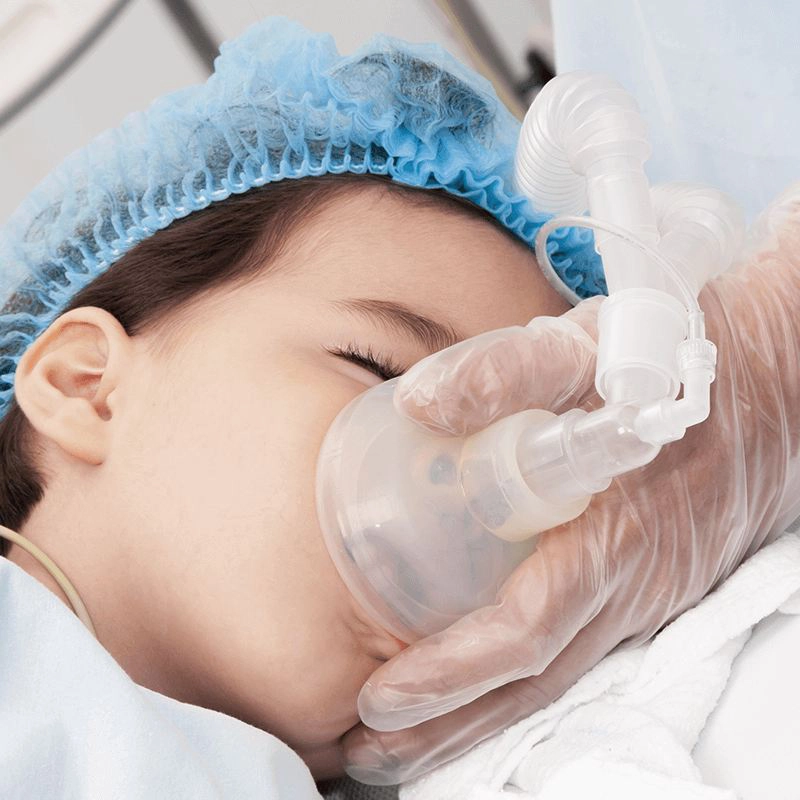Home/Wellness Zone/Sakra Blogs
22nd Nov, 2018

It’s every parent’s nightmare: your child needs surgery. It can be heartbreaking to watch your child being prepared for a surgical procedure, no matter how minor. The first step to a successful surgery is anaesthesia to ensure that the patient is pain-free during the procedure.
Anaesthesia is a state of controlled loss of consciousness in which no sensations are felt. Most surgical procedures are performed under anaesthesia, either local or general.
Local anaesthesia doesn’t usually involve loss of consciousness and sensation is lost only in a small area. This is mostly used for minor procedures. Major surgical procedures require the use of general anaesthesia in which the entire body is affected. General anaesthesia has a few other uses, especially in children.
General anaesthesia will put a patient to sleep so that they feel no pain during medical procedures. In children, certain medical tests such as CT and MRI may also be performed under general anaesthesia.
Anaesthesia may sound risky and you may hear a number of horror stories, but rest assured that modern anaesthetic agents are perfectly safe and effective.
Anaesthesia for Diagnostic Tests
Children can be very active and unruly at times, especially in unfamiliar surroundings like a hospital. This poses a problem while running certain diagnostic tests like CT and MRI which require the patient to be completely still for long periods of time.
In these cases, a child may need to be sedated or put under general anaesthesia in order to run the test. This is done after a complete medical assessment and under the supervision of a paediatrician, a radiologist, and an anaesthesiologist. As with any medical procedure, there are certain risks so the decision to use a sedative or anaesthetic is taken after careful consideration of the pros and cons.
Ideally, a specialised paediatric anaesthesiologist should be involved in any paediatric surgery, but they can be scarce in private hospitals. Sakra World Hospital is one of the few private hospitals in the city with an international board-certified paediatric anaesthesiologist. This is concordance with our mission to provide the best medical care to all our patients, no matter their age.
Anaesthesia is just as much an art as a science. It is vital to find a good anaesthesiologist to ensure that your child’s surgery and recovery is as smooth as possible.
What Can You Do To Prepare Your Child For Anaesthesia?
Your child has to have medical clearance to undergo anaesthesia. This is done through a thorough medical assessment carried out by a team of doctors including an anaesthesiologist.
The anaesthesiologist will ask for your child’s medical history including any pre-existing conditions or allergies, conduct a physical examination, and they may request for some scans as well. Using this information, your doctor will create a personalised anaesthesia plan for your child.
One of the most important instructions you will receive is the 2-4-6 rule. Your child should not eat or drink anything (even water) 2 hours prior to the procedure, have breast milk within 4 hours and formula feeds/milk/solid food within 6 hours. Any food or liquid in the stomach may be regurgitated (vomited) during the procedure and this may be inhaled into the lungs, which can be serious. The body has reflexes to prevent this from happening but these reflexes are blocked by anaesthetic drugs.
You will receive specific instructions from your doctor or nurse on what to do to prepare your child for anaesthesia depending on the child’s age, medical history, and general condition.
Something that often goes overlooked is mentally and emotionally preparing your child for surgery. Talk to your child and listen to their doubts and fears about the procedure. Try to alleviate their apprehension with the help of your doctor.
Caring For Your Child after Anaesthesia
After the surgery is completed, the anaesthesiologist reverses the anaesthesia to wake up the patient. They are then moved to a post-surgical recovery unit where they will be monitored by a medical team for an hour or so, after which they will be transferred to the wards.
They may be drowsy or disoriented when they wake up, so reassure them that all is well. Your child might also feel some pain, discomfort, fatigue, and nausea. This is normal and to be expected after a major surgery.
When you take your child home, you will be given instructions to monitor the surgical site for signs of infections, to watch out for a high fever, severe vomiting, inability to eat, or unusual pain. If your child experiences any of these signs and symptoms, contact your doctor immediately.
Pain Management after Surgery
Adequate management of post-operative pain in children is important to ensure a quick and complete recovery. Pain can be difficult to assess in children, and the parent’s input and cooperation is invaluable in this evaluation.
Post-operative pain is common and can be managed with the use of a number of medications. The choice of medication will depend on the level of pain, the age of the child, pre-existing medical conditions, any other medications the child might be taking, and the wishes of the parents.
Side Effects of General Anaesthesia
Modern anaesthesia is safe and most children experience no untoward consequences. However, in some cases a child may experience side effects like:
While risk cannot be removed completely, modern equipment, technology, training and drugs have made having general anaesthesia much safer. All our consultants at Sakra World Hospital are highly trained and experienced at looking after babies and children.
Enquire Now
